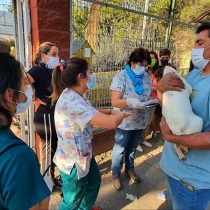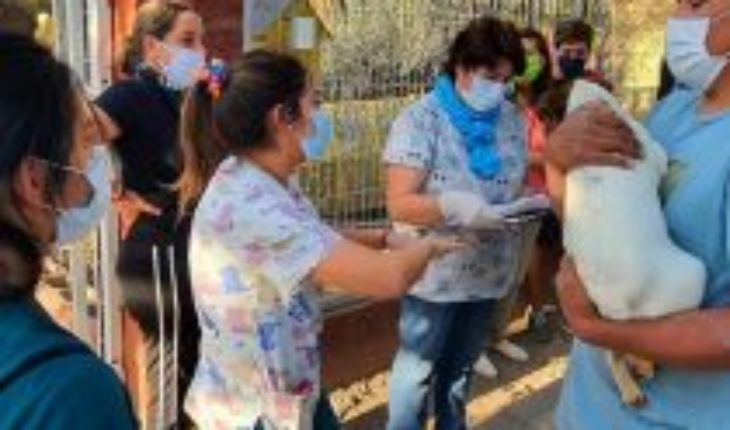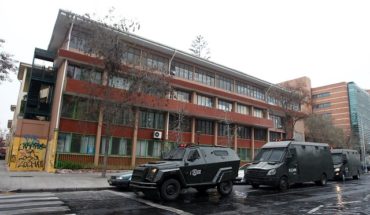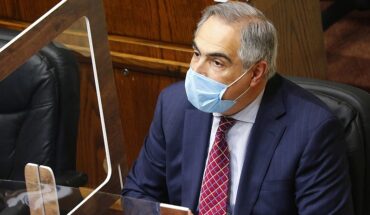
At 22.00 hours this Wednesday, May 20, the Municipality of Peñaflor – through its social networks – asked its community to “do not go to the hospital of Peñaflor, since it is collapsed with patients, there are no beds and the wait for care is 12 hours. And they’re also not doing COVID-19 contingency tests.”
Until before 19.00, when there was excess demand with the arrival of about 100 people accusing some kind of respiratory problem, the capacity of this hospital, which has no critical beds or mechanical respirators, was 95%. In a few minutes the capacity exceeded 100.
The case recorded last night in Peñaflor is part of the constant fear shared by most of the 14 communes of the Metropolitan Region that are not quarantined: the possibility of falling into collapse from one moment to the next. For the mayors Nibaldo Mesa de Peñaflor, Carlos Adasme of Isla de Maipo and Carlos Alvarez de Talagante, the rural communes of the Metropolitan Region, being outside the restrictive measures decreed by the Government, would be being “condemned” by the central level to a “prolonged agony”, which will lead them to transform into “sacrificial zones” of the great Santiago.
11-day delay and false safety
Among the main problems accused by the mayors of Peñaflor, Isla de Maipo and Talagante, is the delay in the delivery of PCR exams. Unlike in other RM communes, these communes belonging to the Western Health Service – which a few days ago showed clear signs of saturation after it became known that the Lucio Córdova Hospital, which is part of the southern health service but which were collaborating with samples from the Western sector, dented more than a thousand samples because they had exceeded the preservation time – have a delay in delivering results that will be between 8 and 11 days, resulting in a false statistic on the number of people infected.
“Of the 200 cases we have sent to check, after 11 days, only 80 reports have arrived, so we do not have how to follow traceability, we cannot deepen the prevention work. The Government urgently needs to correct the delivery system, otherwise we will always be delivering outdated and inaccurate information, which creates doubt and fear in the population,” says Adasme de Isla de Maipo.
In Talagante, Carlos Alvarez accuses the same situation. “Until yesterday we had 136 examinations pending analysis of the samples taken by the Cesfam, Sapu and Sar, but those 136 are from 6 May and today we are at 20. Here there are people who can be positive for coronavirus and throughout this time they have been in contact with other people, especially their family group. This produces a chain effect, which we cannot control.”
In Peñaflor, Nibaldo Mesa reports, meanwhile, that there are 200 outstanding reports. “According to the latest report we have 155 people with Covid positive (in the cumulative). We are one of the 14 communes that we are not quarantined, the second with the most positive cases. But these statistics do not correspond to reality, as the reports that appear in the Minsal statistics account for a reality from 8 to 10 days ago. And the negative thing about everything, he adds, is that these reports are the basis for decreeing measures such as quarantine,” he says.
For the mayors of these RM communes, the delay in delivering PCR reports causes serious problems to Primary Health Care Services (SDPs), which cannot properly control contagions. It also does not allow municipalities to establish prevention or containment plans and, worst of all, they point out, it generates a “false sense of security.” In the absence of mandatory confinement measures, people make their lives normal and the virus is spreading without any control.
Overdemand in health
To this false sense of security, Alvarez de Talagante adds to the social problem that affects workers who are awaiting reports. “Being under the measure of preventive quarantine for more than 10 days, these people cannot go to work, and because they do not have licenses after that time, they will end up being fired. This is the prolongation of agony, to which the central level is condemning us.”
To this situation, he adds, we must add the possible contagions to his close contacts, part of theand those who are positive and don’t know it. “In rural areas we have 10 to 14 people in one house. This results in over-control of the disease in the hands of the SDA and you begin to lose the possibility of control. And the collapse of SSPs results in the collapse of hospitals. In the Hospital de Talagante, patients have already been referred to other centers in Rancagua, because there is no power.”
Mayor Adasme de Peñaflor, for his part, adds that hospitals in rural MRI areas also “have a very lower percentage of beds prepared to receive serious patients, medical personnel do not abound, health infrastructure is minor and without specialties, which in addition to monetary deficits, do not allow to deliver an optimal service”.
This situation was precisely what led to the emergency department in Peñaflor collapsing on Wednesday night. “We don’t have critical beds, we don’t have a respirator. A few days ago there were three people who required intubation and only one could be transferred to another hospital, so the other two patients literally had to give oxygen manually,” says Mesa.
Social pandemic and displacement
For the head of the commune of Peñaflor, the lack of a mandatory quarantine has also affected the impact that many of the people living in nearby communes are moving to rural communes in search of services, increasing the risk of contagion. “Since the establishment of this dynamic quarantine strategy, people living in quarantined communes have momentarily migrated to our communes, which have fewer resources and do not have police, or municipal personnel to do more effective income checks. As we do not decree quarantine in our communes we do not have the power to avoid mass migration on weekends, many of them to friends’ homes, family, etc.”
The most serious thing about this situation is that the disease begins to travel. “Contagion is reduced in the great Santiago but expands in the rural sector. Contagion migrates. That’s why we demand the government. Effective quarantine throughout the region and then start releasing the communes according to their contagion behavior,” adds Adasme from Isla de Maipo.
Nibaldo Mesa hardens criticism. “The government has decided to go after the contagion. And we’re becoming sacrificial zones. What’s going to happen here is that the contagion rate is going to go up, when this could have been avoided. What happens to us is that the people who are quarantined from surrounding communes are moving to our communes, which we are not with the measure, to be able to buy, to do paperwork. Everything they can’t do in their communes comes to do in ours. Dynamic quarantines don’t make sense.”
This dynamism of the strategy – for Carlos Adasme – makes the social pandemic go uphill.” In rural communes poverty is as much or harder than on the periphery of urban communes, but it is also aggravated by the very services that the great Santiago has. Economically, the lack of work resulting from this pandemic is very serious. In Isla de Maipo, the percentage of independents is very high and the dependents are linked to the agricultural activity that has gone down, so we have a situation that is rapidly being complex. This is why it was key to have encapsulated contagion more than a month ago, as the mayors have asked, with an effective quarantine of about 15 days, with a good package of economic measures for the population. Unfortunately, the Government’s strategy is lengthening the situation and adds more and more problems.”





